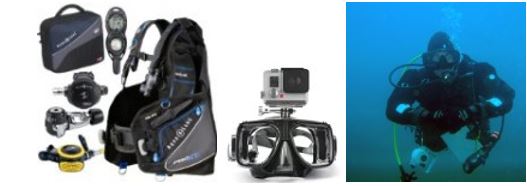
“If you dive less than 7 to 14 times a year, you might want to take a refresher course before you go on your next big vacation or scuba dive adventure.” You’ve probably read something like this in your introductory scuba course, a dive magazine, or heard it down at a local dive shop. The reason is simple, if you practice diving on a regular basis, you become more familiar with more facets of your dive gear and scuba diving conditions in general. Being comfortable with your dive gear and the local dive conditions is the goal of every diver as it enhances your overall dive experience. But besides the basics, what else can you do to ensure a safe and enjoyable dive the next time out? Perhaps we should talk about dive gear first.
Even if you are diving warm waters, we recommend wearing a full rash guard or preferably a 3ml wetsuit that covers your torso, arms, and legs. Sure, during your first dive of the day, you may feel warm and perfectly comfortable wearing just a swimsuit, but after several dives and several days, you may start to feel cold before the end of the dive, and the urge to find a bathroom will eventually override your desire to maximize your bottom time. Acting on this urge before surfacing only exacerbates the situation by briefly heating your outer extremities then cooling them down while your blood vessels have become dilated by the sudden warmth which makes your heat loss increase exponentially. A wetsuit or rash guard is also a good way to protect from getting sunburned shoulders and legs when you are diving less than 20ft below the surface or doing decompression stops. A hood, bandana, cap or scap also works as the ultimate sun blocker for your head, especially if your hair is short.

Having your own gear with you on a trip always reduces anxiety because you’re familiar with how it operates and comfortable with how it fits. Sometimes however, renting gear is the best option, especially when it comes to the airlines baggage policies and added cost. We always recommend taking your own mask, booties and dive computer as there is nothing worse than a leaky mask and a limited or unfamiliar computer. Fins could be added to the essentials so you are ensured to have a pair that properly fits. As for the rest of your rental gear, be sure and do an easy shallow shore dive to make sure you are absolutely comfortable with how the unfamiliar gear operates, sits, and fits. Now if you dive with steel tanks and you find yourself using rental aluminum tanks while on vacation, you’ll need to add some additional weight too.
Everyone talks about how important buoyancy is and we recommend working on perfect buoyancy so you can glide underwater and surface later on as soft and slow as a snowflake or leaf swept along in a gentle breeze. But what if your next dive adventure calls for diving down quickly to get below the swift currents near the surface? You might need a little more weight, and little more practice to control a quicker descent. Also, the added weight will affect how much air and at what rate you need to expel air from your BC on your ascent back to the surface too. Practicing with a few extra pounds of weight will lessen your overall anxiety when it comes to diving in areas where currents are typically stronger.

Task overloading is a common phenomenon that can lead to symptoms of high anxiety. If you have been out of the water for a while, chances are diving a deep night drift wreck dive from a boat while navigating using dive lights and taking video/pictures while lobster hunting is going to feel like a multitasking nightmare. Perhaps a better option is to strap on an underwater action video camera in place so you are hands free. For all the different types of diving you plan on doing, it is recommended that you pursue proper certification and training in each of these fields separately and in advance allowing you to be prepared for your next dives. Skills in boat diving, deep diving, drift diving, night diving, and navigation to name a few, could be used at almost any resort or dive site worldwide. When you’re trained properly, it is easier to anticipate your needs, plan your dive, and actually dive your plan from any of the many exciting dive destinations in which you may find yourself. Also, good dive operators are there to help you. Don’t hesitate to communicate any concerns you may have. Even the most experienced divers have encountered feelings of unease and apprehension. Voicing any worries along with training with your anticipated gear and familiarizing yourself with local dive conditions increases your safety, knowledge, confidence, and your ability to make the best decisions when it counts most, thus making every dive more pleasurable and anxiety free.
Content Provided Compliments of Maduro Dive Fanta-Seas || www.madurodive.com